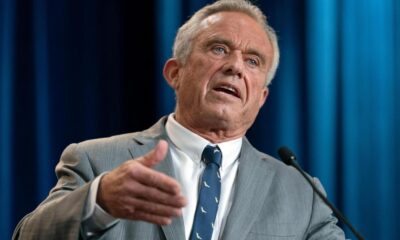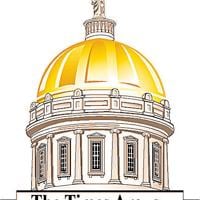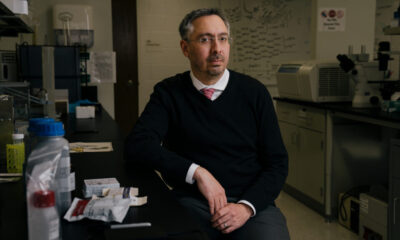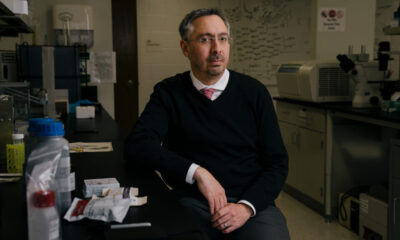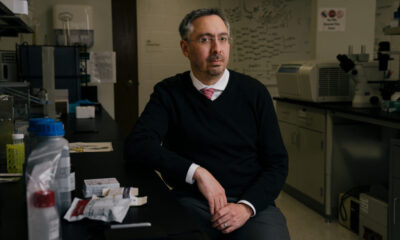Health
Dartmouth Researchers Face Funding Cuts Amid Trump Administration’s Changes
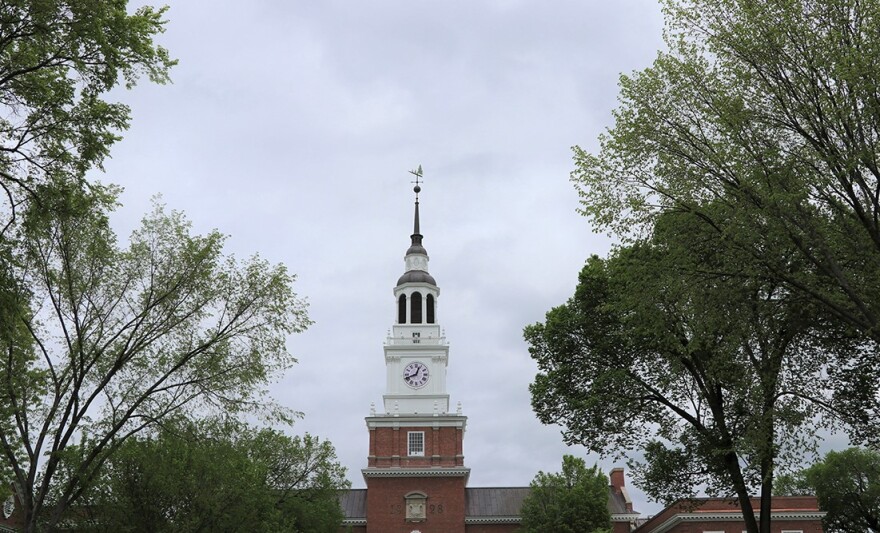
Researchers at Dartmouth Hitchcock Medical Center are grappling with significant funding cuts resulting from recent changes instituted by the Trump administration, particularly affecting biomedical research. Dr. Steven Bernstein, a researcher at the center, was set to investigate the health challenges faced by farm workers in northern New Hampshire and Vermont, specifically within the dairy industry. His project aimed to identify and improve the social determinants of health affecting this vulnerable population, many of whom come from Central America.
The National Institutes of Health (NIH), recognized as the world’s leading funder of biomedical research, had previously called for studies focusing on such health disparities. However, under the current administration, funding opportunities for research related to diversity, equity, and inclusion (DEI) have been curtailed. Bernstein’s proposal, which would have required approximately $3 million over five years, was among those affected when NIH eliminated the funding pool.
In an interview, Bernstein expressed deep concern over the impact of these cuts, particularly for early-career researchers. “There’s been tremendous anxiety and unease and fear among all of us,” he noted. He emphasized the importance of initial funding in shaping the future of young investigators’ careers, describing the current climate as stressful and uncertain.
At Dartmouth Hitchcock, while the overall number of canceled or denied grants has been modest, the broader implications of the administration’s actions are evident. Bernstein, who also serves as chief research officer, highlighted several categories of affected projects. The first includes grants that have already been awarded but subsequently terminated by the federal government, which has led to at least three federal grants being canceled at Dartmouth College. These grants pertained to research on circadian rhythms, opioid addiction treatment, and mentorship programs for underrepresented students.
The second category involves grants that have not been formally terminated but are experiencing significant delays in funding notifications. Bernstein explained that researchers are now facing prolonged uncertainty regarding the continuation of their projects, which has forced Dartmouth Hitchcock to front the costs temporarily. “They’re in a bit of a limbo,” he said, as researchers await the necessary funding updates.
The third category encompasses research proposals that were never submitted due to the elimination of funding opportunities, including Bernstein’s study on farm workers. Lastly, there is a growing concern regarding the potential loss of scientific talent, as some researchers contemplate leaving their careers in light of the current funding landscape.
Bernstein illustrated the potential long-term consequences of these changes, stating, “this 80-year project to build the American biomedical research enterprise into the envy of the world is at real risk of generational damage.” He pointed to the MOSAIC program, designed to support young biomedical scientists from underrepresented backgrounds, as an example of valuable initiatives that have been cut.
Despite the challenges faced, Dartmouth College and Dartmouth Hitchcock have managed to avoid the more severe impacts experienced by other institutions. Notably, Dartmouth’s president, Sian Leah Beilock, was the only Ivy League leader not to join over 600 other college and university presidents in condemning the federal funding cuts, earning the institution a reputation as “the Ivy League’s Switzerland” for its neutrality.
As the situation unfolds, Bernstein noted that Dartmouth has seen an influx of qualified applicants from other institutions facing harsher funding restrictions. While this presents a recruitment opportunity, it is distressing to consider the circumstances that have prompted these shifts.
The White House has not responded to requests for comment on the matter. The ongoing situation underscores the critical intersection of politics and scientific research, raising questions about the future of biomedical funding and the potential implications for public health initiatives across the nation.
-

 Technology5 months ago
Technology5 months agoDiscover the Top 10 Calorie Counting Apps of 2025
-

 Technology2 weeks ago
Technology2 weeks agoOpenAI to Implement Age Verification for ChatGPT by December 2025
-

 Health3 months ago
Health3 months agoBella Hadid Shares Health Update After Treatment for Lyme Disease
-

 Health3 months ago
Health3 months agoErin Bates Shares Recovery Update Following Sepsis Complications
-

 Health3 months ago
Health3 months agoAnalysts Project Stronger Growth for Apple’s iPhone 17 Lineup
-

 Technology4 months ago
Technology4 months agoDiscover How to Reverse Image Search Using ChatGPT Effortlessly
-

 Technology3 months ago
Technology3 months agoElectric Moto Influencer Surronster Arrested in Tijuana
-

 Technology2 months ago
Technology2 months agoDiscover 2025’s Top GPUs for Exceptional 4K Gaming Performance
-

 Technology5 months ago
Technology5 months agoMeta Initiates $60B AI Data Center Expansion, Starting in Ohio
-

 Technology5 months ago
Technology5 months agoRecovering a Suspended TikTok Account: A Step-by-Step Guide
-

 Health5 months ago
Health5 months agoTested: Rab Firewall Mountain Jacket Survives Harsh Conditions
-

 Lifestyle5 months ago
Lifestyle5 months agoBelton Family Reunites After Daughter Survives Hill Country Floods

